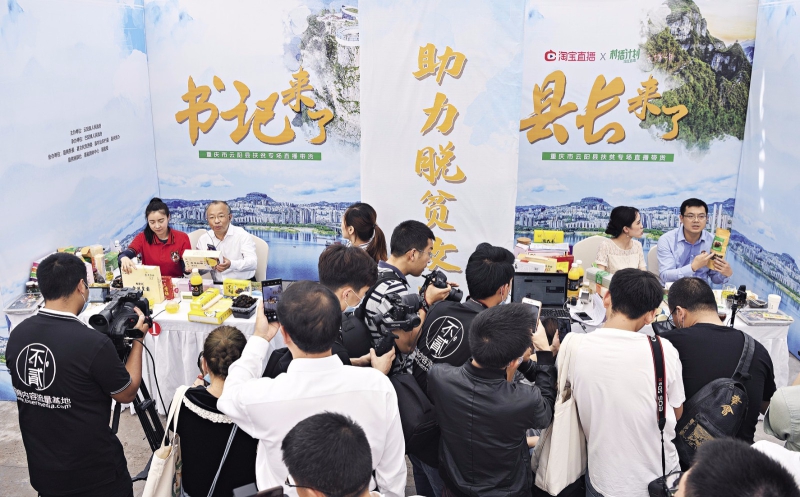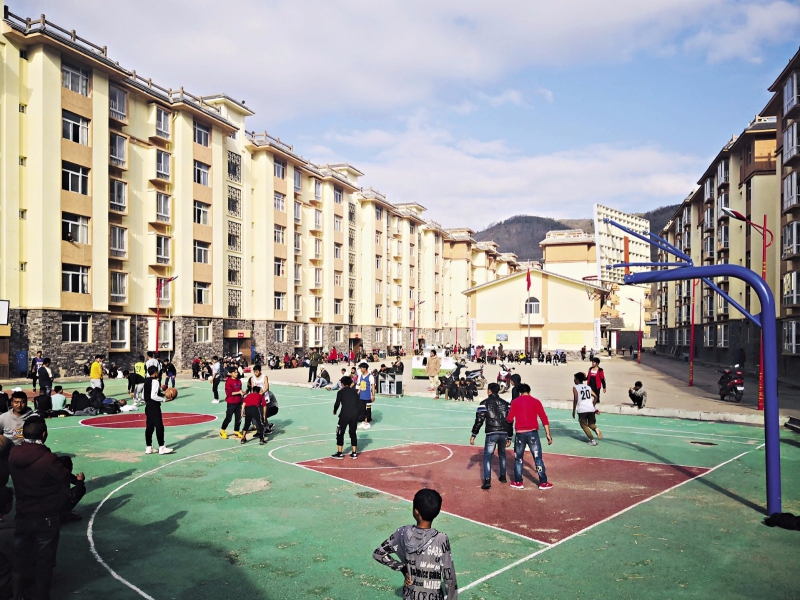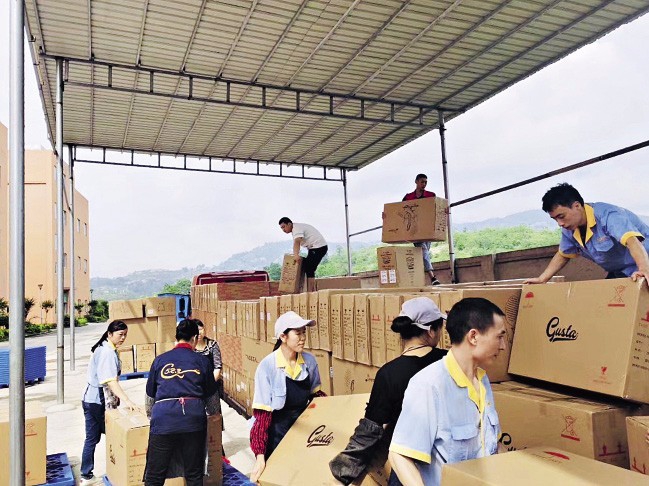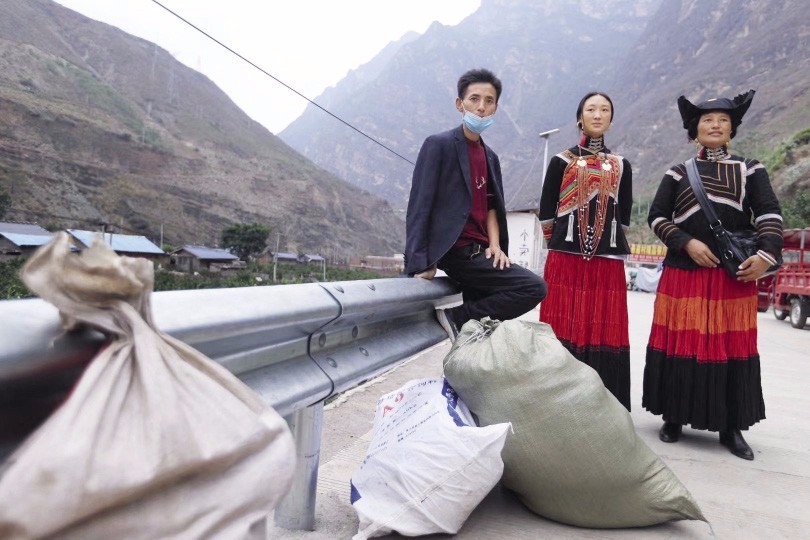A live broadcast to sell local agricultural products for the purpose of poverty alleviation is held in Yunyang County, Chongqing Municipality.
Zheng is also the general manager of Zunyi Shenqu Musical Instruments Manufacturing Co., Ltd. Before starting his journey to Beijing, he stopped by his company’s workshop located in the county’s economic development zone to check up on the guitar shipments for the day. He then wrote in his WeChat’s Moments, “Thank you, my country. Even though the pandemic is so serious, we can still ship goods to countries around the world every week.”
Industry Drives Poverty Alleviation
Zheng’an County is located in the depths of mountains in Zunyi City, and is China’s largest guitar production base. It is home to 27 well-known guitar manufacturers who have a total annual output of 6 million guitars. These products are exported to more than 30 countries and regions around the world.
The guitar production in the county resumed work in early March, but then towards the end of March, 30 enterprises in the industrial park faced a risk of shutdown. With the outbreak of the COVID-19 pandemic worldwide, most of the overseas purchasers who had not canceled their orders had requested that their shipments be postponed indefinitely, putting these guitar manufacturers in a dilemma. “If the shipments are postponed for three months, we will have a backlog of 150,000 guitars, which will tie up a large sum of working capital. Without working cash, our business will collapse,” said Zheng.
At that critical moment, the local government decided to help these enterprises resolve their financial difficulties. “These enterprises can’t go out of business. Once that happens, it is a fatal blow to our county’s poverty alleviation endeavors,” said Meng Xi, director of the Zheng’an County Economic Development Zone Administrative Committee. In March of this year, the county was just withdrawn from the list of national-level poverty-stricken counties, and guitar manufacturing is one of the most important industries through which local companies can help people escape poverty. In the industry chain, there are 72 production and supporting enterprises, creating more than 14,000 jobs for local residents.
Children playing on the playground in front of their new homes in the relocation settlement of Zhaojue County, Sichuan Province.
In order to stabilize the industrial chain and consolidate the achievements of poverty alleviation, the local government decided to provide a series of financial support for guitar companies from April to July, including government guarantees and government interest subsidies. In addition to this, the industrial park has also assisted the guitar manufacturers in attracting domestic investment and expanding online marketing via e-commerce platforms.
With government assistance, the companies have broadened their sales channels with various methods of marketing, such as livestreaming and hosting online national guitar playing contests. The entire industry chain seeks opportunities to improve business during the crisis. “Currently, more than 70 guitar-related enterprises in Zheng’an have basically achieved full production capacity owing to the increasing domestic orders. With the epidemic situation being gradually stabilized, foreign trade orders are also in the stage of gradual recovery, and export shipments have begun,” said Meng.
In dealing with the impact of the COVID-19 epidemic on the industrial chain, the local government and enterprises worked together to withstand the pressure, save employment, save production, and consolidate the results of poverty alleviation.
The industrial development serves as the foundation for poverty alleviation. Presently, 92 percent of China’s poor population are involved in industrial poverty alleviation, and 72 percent of those who have lifted themselves out of poverty are the beneficiaries of industrial poverty alleviation policies. In the existing 52 poverty-stricken counties across China, 122 leading industries have been developed, and are expected to help more than 3 million poor people increase their annual per capita income by at least RMB 1,700.
Relocating to Better Environments
On the early morning of May 13, Mouse Laluo and his wife Jike Jinniu in Atulieer Village packed up their luggage. The wife wore the traditional Yi clothes and earrings that she usually only put on during festive occasions. The couple and their children would move into a beautiful new home in a resettlement community of the county for the poor. The relocation program for this remote village involved a total of 344 people in 84 poverty-stricken households whose ancestors had lived there for generations.
Located up on a mountain at an altitude of 1,700 meters in Zhaojue County, Liangshan Yi Autonomous Prefecture of Sichuan Province, the village is only accessible by climbing up an 800-meter cliff, so it is referred to as the “cliff village.” In 2015, a video clip of the village children climbing a vine ladder on their way to school attracted much attention from media at home and abroad. “Due to lack of road access, the children here studying at a school down the mountain usually have classes for 10 days and then take five days off,” Pacha Youge, the village head, explained the situation of the children education in the village. The kids in the village must be around nine years old to go to first grade. Even with the help of parents, it is impossible for a younger child to go down the mountain safely.
Even during the epidemic, Zheng’an guitars are still transported to domestic and international markets.
In order to provide the children with a safer means of going down the mountain to school, in 2016, the local government built a solid steel ladder for the villagers. Under the guidance of the government, the villagers also started to develop rural tourism. “Although the village now has a steel ladder, it is still inconvenient to enter the village. The children still have to climb up and down the cliff when traveling between school and home. We also still struggle to transport our living supplies,” said Mouse Laluo.
Relocation becomes the only solution to completely change the lives of the poor people there. There are a total of 164 households in the village, of which 84 registered poor families have been relocated recently. According to the housing standard of 25 square meters per person at the resettlement site, the Mouse Laluo family of four was given a new house of 100 square meters, with all living accommodations including beds, a dining table and wardrobes. The two children can attend school nearby to receive an education that their parents had no chance to receive. Mouse Laluo has found a job at a construction site in the county town, and his wife works at a restaurant near home. The family is looking forward to their new life.
“After moving into the county town, the children will enjoy better education, medical care, and other public resources. Young adults can choose to work in the town or continue their tourist business back in the cliff village. For those who choose to stay on the mountain, the government will increase its support for the development of tourism industry so that both the people who live on and off the mountain can live and work happily,” said Pacha Youge.
Moving down the mountain is just the first step, and solving the living problmes in the new environment is even more important. “Resolving the employment problem for the relocated people can ensure a stable life for them, prevent poverty from recurring, and gradually help the people to earn a comfortable income,” said Secretary of Zhaojue County Party Committee Zike Lage.
Like the residents of the cliff village, this year more than 18,000 poor people in Zhaojue County will move into their new homes. So far more than 10 modern agricultural industrial parks have been launched near the resettlement communities to provide the poor people with jobs and opportunities to increase income. In addition, the county has also developed more than 5,000 public welfare positions for those with insufficient labor capacity or having difficulties in working elsewhere.
Zhaojue County is located in a deeply impoverished area, which means a great challenge for the local officials and people to overcome poverty. There are currently 55 poverty-stricken villages in the county, with 33,000 registered poverty-stricken people. Zike Lage said that the local government leaders are determined to lift all poor people out of poverty through relocation and industrial development.
With the relocation of the cliff village, Sichuan’s poverty alleviation relocation program of 1.36 million people is approaching its completion. This year, more than 9.6 million poor people in China will get rid of the poverty plight through relocation.
Villagers from the “Cliff Village” are about to move into their new homes with a modest amount of luggage.
Rural Cloud Economy
On May 10, Wang Tao, an official sent from Beijing to assist Xinjiang, took Hetian’s high-quality agricultural products with him to a live streamed poverty alleviation event held in a Beijing district. The selected rose sauce became the best-selling product during the event. “The live broadcast lasted 90 minutes, and attracted 505,000 viewers with 78,000 likes,” said Wang.
According to Wang, the Hetian agricultural products experienced a cliff-like decline in sales as a result of the COVID-19 outbreak during the months of January to March. The livestreaming marketing activity in Beijing helped him fully realize the true power of the Internet. Back in Hetian, Wang also received feedback from several poverty alleviation companies saying that the livestreaming had a positive effect on selling goods, increasing sales by 20 percent year-on-year.
In response to the challenges of Hetian’s remote location in western China, which results in long delivery time of goods and relatively high freight costs, Wang organized negotiations between rural businesses and the local postal service, and thus effectively resolved some of the problems.
“The government offers platforms and arranges logistics, while companies only need to provide samples,” said Wang. In Hetian, using livestreaming to sell goods is sponsored by the government and well received by companies. “The purpose is not just to sell goods, but also to promote the Hetian brand. Since Hetian is 4,500 kilometers away from Beijing, the online live broadcasts have shortened the distance between Hetian producers and Beijing consumers,” Wang said.
Livestreaming marketing increased convenience and efficiency for consumers across the country to purchase agricultural products in impoverished areas through smart devices during the epidemic. Tens of thousands of vegetable greenhouses and poverty alleviation workshops were presented in front of cameras. Today, livestreaming has become an important way of poverty alleviation.
Shi Longxue, deputy dean of the Beijing International Institute for Urban Development, believes that livestreaming marketing has effectively driven the development of the “cloud economy” in the online sales of agricultural products in China. In addition to this, it is necessary to unblock online and offline sales channels for agricultural products in poor areas to form a long-term poverty reduction mechanism.
According to data from the Ministry of Commerce, the national retail sales of agricultural products reached RMB 397.5 billion in 2019, a 1.5-time increase from 2016. Up to now, there have been more than 13 million rural online merchants across the country, a fact that attracts a large number of migrant workers, college graduates, and veterans to return to their hometowns to start their own businesses. A steady flow of talents returning to their hometown regions, accordingly, has added new impetus to the regional poverty alleviation and rural revitalization.



